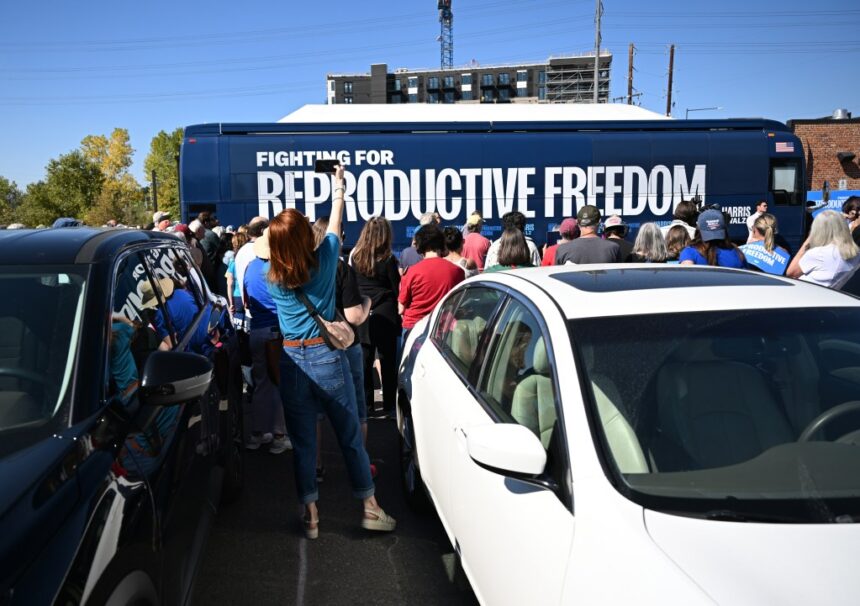A blue bus emblazoned with the words “Fighting for Reproductive Freedom” pulled up outside a brewery in Denver last week, attracting a crowd of over 100 people. It was part of the Harris-Walz campaign’s effort to bring the national battle for abortion access to Colorado.
Reilly Jackson, 20, waited in the throng outside Raíces Brewing Company with Dani Dawes Cox, 34.
“An abortion ban is a ban on women being able to receive good health care, and to really save their lives in a lot of cases,” said Jackson, a student at the University of Colorado Boulder. “Those decisions need to stay between a woman and her doctor — and the government needs to stay out of it.”
In the Nov. 5 election, Coloradans will decide on the future of abortion access in the state when they consider a ballot question that would elevate abortion protections to the state constitution. But in the continuing fallout from the U.S. Supreme Court’s 2022 decision overturning Roe v. Wade, the issue also permeates the rest of the ballot, with abortion stances influencing the presidential and downballot races.
Abortion has ranked among the top five most important issues identified by voters participating in The Denver Post’s ongoing Voter Voices survey, carried out in partnership with other media outlets through the Colorado News Collaborative.
The gathering outside Raices showed how Vice President Kamala Harris’ presidential campaign and Democrats in general are harnessing abortion as a tool to motivate voter turnout.
Attendees chanted, “When we fight, we win,” before the speakers — Gov. Jared Polis, U.S. Rep. Diana DeGette and U.S. Sen. John Hickenlooper among them — stepped off the large vehicle.
“This is truly a fight for our future,” Polis told the group. “And in Colorado, we’re taking action.”
On mail ballots that were sent out in the last week, voters face Amendment 79, which requires 55% support to pass since it would amend the state constitution. Besides enshrining the state’s existing wide-ranging abortion protections in that document, the measure would repeal language from 1984 that prohibits the use of state and local government funding toward abortion services. Doing so would allow the state to greenlight abortion coverage for Medicaid enrollees and public employees on government health insurance plans.
Supporters of the ballot measure, including leading Democratic elected officials, say they want to protect abortion access in Colorado from future political decisions. Opponents, including many conservatives and anti-abortion groups, say they’re against putting taxpayer funds toward abortion.
Colorado is among 29 states where abortion is broadly legal two years after Roe’s repeal, including states with varying degrees of protective laws along with a handful where bans have been blocked by the courts, according to The New York Times. Among the 21 states with more restrictions than Roe allowed, 13 now prohibit abortion fully.
Statistics show that Coloradans tend to support abortion access. Here, both residents and out-of-state visitors can obtain abortions, which are accessible at any pregnancy stage.
In 2020, Colorado Proposition 115 — a ballot measure that would have banned abortion after 22 weeks of pregnancy — failed, with 59% of voters against it. In 2022, 67% of Colorado voters said they agreed women should have access to abortion care in a survey that was conducted by Global Strategy Group, a Democratic polling firm, and co-sponsored by ProgressNow Colorado, a progressive advocacy group.
Playing out in presidential race
But 20 miles away from the Harris-Walz bus stop on a different day, former President Donald Trump’s rally in Aurora on Friday showed a different side of abortion politics. In part, it was about its absence: During the Republican nominee’s hour and 20 minute speech at the Gaylord Rockies Resort and Convention Center, he didn’t touch on abortion, focusing on illegal immigration and crime instead.
However, outside the complex, a woman asked any Colorado residents standing in the entry queue to vote no on Amendment 79.

Among groups opposing the measure is Colorado Right to Life.
“Colorado does not want Amendment 79, according to polling,” suggested Scott Shamblin, the organization’s executive director. “Your tax dollars are going to pay for the abortions, and they don’t like that.”
He declined to share the polling results with The Post but said that survey was conducted by the 76 Group, a local public affairs firm, which didn’t respond to a request asking for details on those results. Shamblin said he’s also against Amendment 79 because of a concern among opponents that it would keep the state from enforcing any parental notification requirements when minors seek abortion.
While Harris’ stance on abortion has remained steadfast in support of ensuring access, Trump’s position has shifted over the years.
During his presidential term, he nominated three of the five Supreme Court justices who struck down Roe v. Wade — a reversal for which he claims responsibility.
But on Sunday, he told Fox News that a federal abortion ban is currently “off the table.” It follows his comments from earlier this month that he would veto a nationwide ban as president because he considers it an issue for the states to decide.
Among the conservative base and some Republican congressional candidates, there is support for more federal restrictions, up to a national ban for some. And an oft-repeated talking point, including by Trump, is that several Democratic states have legalized abortion after birth — or intend to do so. But infanticide, which is murder, is not legal in any U.S. state.
Harris has made protecting reproductive rights a key part of her platform. If elected, she has promised to sign any congressional measures that would restore abortion access across the country. Harris says the issue also includes ensuring access to reproductive health care, such as in vitro fertilization treatments and contraception.
Stephanie Lang, a self-identified liberal who lives in Denver, was among voters who ranked abortion as their most important issue in the Voter Voices survey.
Lang is at an age where she’s considering pregnancy, and she says having access to abortion care means there’s a plan in place for her in case an unexpected medical emergency arises.
“Going into this type of decision, there’s a lot of unknowns,” she said in an interview.
Lang also contends that protecting abortion access in Colorado would benefit the broader region.
“If Colorado has this,” Lang said, “it’s going to be a safe haven for the states around us.”
Republican and Democratic stances in Colorado

Colorado counts as a blue state, and Democratic state legislators are vocal about abortion access. And all eight Democrats running for the state’s seats in the U.S. House of Representatives want to press for abortion access on the federal level, according to The Post’s candidate questionnaires.
“As a doctor, I have seen firsthand how dangerous complications during pregnancy can be and how limiting access to reproductive care can put lives at risk,” U.S. Rep. Yadira Caraveo, who’s locked in a tough reelection campaign in the north-suburban 8th Congressional District, wrote in her response. “Politicians have no place in an exam room, and they should not criminalize or dictate treatment for patients.”
Republicans in the congressional races tend to tread carefully on the abortion issue, largely portraying it as a matter for the states to decide. The majority of GOP candidates took this perspective in their candidate questionnaires.
In addition to opposing a federal ban, state Rep. Gabe Evans — Caraveo’s Republican challenger — stands against taxpayer funding of abortion. But if abortion is limited at the state level, he supports exceptions for rape, incest and life-threatening situations faced by pregnant women, according to his response.
U.S. Rep. Lauren Boebert, who’s running in the 4th District against Democrat Trisha Calvarese after representing the 3rd District for two terms, was more outspoken on abortion than most Republicans, backing a nationwide ban.
“I am fully in support of a federal pro-life law that protects the lives of the most vulnerable members of our society,” Boebert wrote in her questionnaire response. “I will continue to give a voice to the voiceless, protect the unborn, and support life.”

Coloradans for Protecting Reproductive Freedom, a coalition of six organizations including the ACLU of Colorado and ProgressNow Colorado, has campaigned for the passage of the ballot measure. Karen Middleton, the president of Cobalt, argued that abortion access in Colorado “remains vulnerable to extremist attacks” because it’s not protected in the state constitution.
“Politicians try to ban abortion every election,” Middleton said during an Oct. 1 news briefing.
However, Catherine Wheeler, the president of the Colorado chapter of the American Association of Pro-life OB/GYNs, stands against Amendment 79. The doctor once performed second-trimester abortions in Utah, but she is now an anti-abortion advocate.
“This is a human being from the very beginning,” Wheeler argued.
She characterized Colorado’s current abortion policies as “really extreme,” in part because they don’t include gestational limits. Wheeler referred to Amendment 79 as “a ban on any common sense regulation of abortion, including late abortions.”

Her case for opposing the ballot measure includes concern over the potential use of taxpayer funds for abortion, as she claims the public money will pay for out-of-state residents, too.
Jack Teter, the regional director of government affairs at Planned Parenthood of the Rocky Mountains, countered that Americans don’t generally “get to pick and choose” their taxes.
“You might not want to pay for the surgery of someone who was in a car accident because they were driving drunk,” Teter said in an interview. “That’s not how health insurance works, right? We provide health care for people who need it.”
But he added that “there’s no mechanism” to use Colorado-specific insurance plans for out-of-state residents.
Stay up-to-date with Colorado Politics by signing up for our weekly newsletter, The Spot.
Originally Published:










